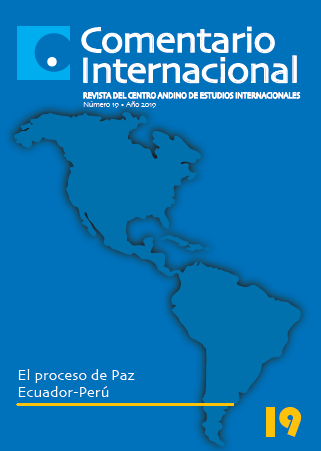La Visión de América Latina sobre el Reglamento General de Protección de Datos
DOI:
https://doi.org/10.32719/26312549.2019.19.4Keywords:
GDPR, data protection, risk assessment, privacy, technology, law, freedomsAbstract
25, 2018, most Latin American countries started into a process to reform and create new data protection laws that meet the requirements of the GDPR. However, there are some big challenges considering the technical nature of the GDPR based on a risk-based approach and impact assessments. The need to comply with the new GDPR is essential due to the integration processes and trade agreements between both regions. Most Latin American countries have followed the European vision on the protection of personal data, in contrast to other world powers with lower privacy protection standards. This influence of the European Union in Latin America means that cooperation between the two regions is a must and it will help us to achieve a strategic alliance towards the fourth industrial revolution.
Downloads
References
Argentina, “Proyecto de Ley de Protección de Datos Personales primera versión”, Senado y Cámara de Diputados de la Nación Argentina, 2018. ‹https://bit.ly/3hIvlUk›.
Argentina. Ley de Protección de los Datos Personales n.° 25.326, 4 de octubre de 2000.
Agencia Española de Protección de Datos. “Transferencias internacionales”. AEPD. 30 de agosto de 2019. ‹https://bit.ly/2Xsswj0›.
Antonini Pascal, Bernard Duverneuil y Bertrand Diard. “Enterprises: les clés d’une application réussie du GDPR”. CIGREF, AFAI et TECH in France. 14 de noviembre de 2017. ‹https://bit.ly/2K5GEXA›.
Banck, Aurélie. RGPD: La protection des données à caractère personnel. Francia: Gualino, 2018.
Bennani Younés. “Apprentissage par réseaux de neurones artificiels”. EPAT, France. 6 de junio de 2014.
Brasil. Lei Geral de Proteção de Dados n.° 13.709, 14 de agosto de 2018.
CEPAL. La Unión Europea y América Latina y el Caribe: Estrategias convergentes y sostenibles ante la coyuntura global. Santiago: CEPAL, 2018.
Cichonsky Paul, Tom Millar, Tim Grance y Karen Scarfone. “Computer Security Incident Handling Guide”. National Institute of Standards Technology, Special Publication Revision 2, n.° 800-61 (2012). doi:10.6028/NIST.SP.800-61r2
Colombia. Ley Estatutaria 1581, 18 de octubre de 2012.
Comisión Europea. Reglamento del Parlamento Europeo y del Consejo relativo a la protección de las personas físicas en lo que respecta al tratamiento de datos personales y a la libre circulación de estos datos (Reglamento general de protección de datos), 25 de enero de 2012. ‹https://bit.ly/2XlTg51›.
CNIL. “Security of Personal Data”. Commission Nationale de l´Informatique et des Libertés, 2018.
CNIL. “Privacy Impact Assessment Methodology (PIA)”. Commission Nationale de l´Informatique et des Libertés, 2018
Desgens-Pasanau, Guillaume. La protection des données personnelles. Francia: Lexis Nexis, 2019.
Dionne, Georges. “Risk Management: History, Definition and Critique”. Risk Management and Insurance Review 16, n.° 2 (2013): 147-66. doi:10.2139/ssrn.2231635
DLA Piper. “DLA Piper GDPR data breach survey: February 2019”. 20 de enero de 2020. ‹https://bit.ly/2Vi6Tzz›.
England, Rachel. “Tim Cook calls for GDPR-style privacy laws in the US”. Engadget. 24 de octubre de 2018. ‹https://engt.co/2y3uMm9›.
Enríquez, Luis. “Paradigmas de la protección de datos personales en Ecuador. Análisis del proyecto de Ley Orgánica de Protección de datos”. Foro 27, n.° 1 (2017): 43-61.
Enríquez, Luis, Marcel Moritz, Valentin Gibello, Lorena Naranjo Godoy, Andrea Villalba Fiallos y Claudia Orellana Robalino. “La protección de datos personales en la era digital”. Foro 27, n.° 1 (2017).
Haas, Gérard. Le RGPD expiqué à mon boss. Francia: Kawa, 2017.
Henry, Paul, Jacob Williams y Benjamin Wright. “The SANS Survey of Digital Forensics and Incident Response”. Tech. Rep. 18 de julio de 2013.
Hildebrant, Mireille. “Data driven intelligence and Data Protection Law”. Global Privacy Assembly. 17 de octubre de 2016.
Humphreys, Edward. Implementing the ISO/IEC 27001 ISMS Standard. Estados Unidos: Artech House Publishers, 2016.
Kriesel, David. A Brief Introduction to Neural Networks. Alemania: University of Bonn, 2005. ‹https://bit.ly/2RGioQb›.
Lawrence Öqvist y Filip Johnssén. Hands-On Guide to GDPR Compliance: Privacy by Design, Privacy by Default. Estados Unidos: IAPP, 2018.
México. Ley Federal de Protección de Datos Personales en Posesión de los Particulares, 5 de julio del 2000.
Parlamento Europeo. “Blockchain and the General Data Protection Regulation”.
European Parliamentary Research Service, Scientific Foresight Unit (STOA). Julio de 2019.
Perú. Ley de Protección de Datos Personales n.° 29733, 3 de julio del 2011.
Salomon, David. Foundations of Computer Security. Reino Unido: Springer, 2006.
Smith, David. Preparing for the data protection regulation. Reino Unido: Allen & Overy, 2018.
Uruguay. Ley de Protección de Datos Personales n.°1833, 11 de agosto del 2008.
Unión Europea, Reglamento (UE) 2016/679 del Parlamento Europeo y del Consejo, 27 de abril de 2016.
Downloads
Published
How to Cite
Issue
Section
License
Authors who publish in this journal accept the following conditions:
1. The authors keep the copyright and assign to the journal Comentario Internacional the right of the first publication, with the work registered with the attribution license of Creative Commons, which allows third parties to use what is published whenever they mention the authorship of the work and the first publication in this journal.
2. Authors can make other independent and additional contractual arrangements for the non-exclusive distribution of the article published in this journal (eg, include it in an institutional repository or publish it in a book) provided they clearly indicate that the work was published for the first time in Comentario Internacional.







